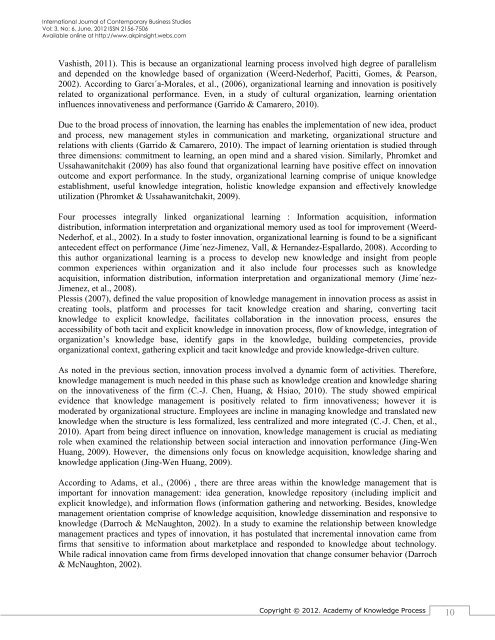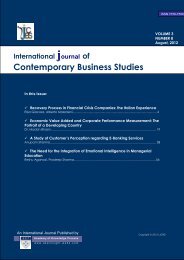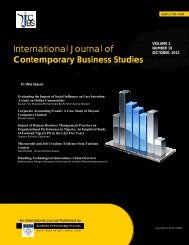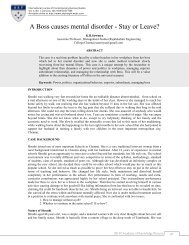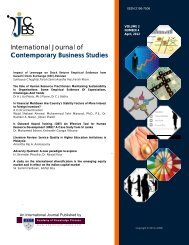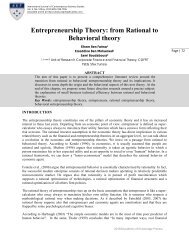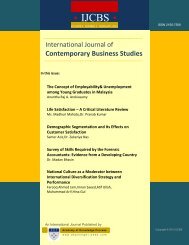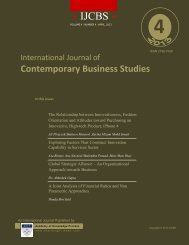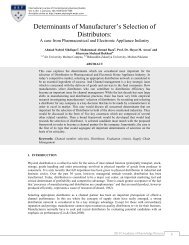International journal of Contemporary Business Studies
International journal of Contemporary Business Studies
International journal of Contemporary Business Studies
You also want an ePaper? Increase the reach of your titles
YUMPU automatically turns print PDFs into web optimized ePapers that Google loves.
<strong>International</strong> Journal <strong>of</strong> <strong>Contemporary</strong> <strong>Business</strong> <strong>Studies</strong><br />
Vol: 3, No: 6. June, 2012 ISSN 2156-7506<br />
Available online at http://www.akpinsight.webs.com<br />
Vashisth, 2011). This is because an organizational learning process involved high degree <strong>of</strong> parallelism<br />
and depended on the knowledge based <strong>of</strong> organization (Weerd-Nederh<strong>of</strong>, Pacitti, Gomes, & Pearson,<br />
2002). According to Garcı´a-Morales, et al., (2006), organizational learning and innovation is positively<br />
related to organizational performance. Even, in a study <strong>of</strong> cultural organization, learning orientation<br />
influences innovativeness and performance (Garrido & Camarero, 2010).<br />
Due to the broad process <strong>of</strong> innovation, the learning has enables the implementation <strong>of</strong> new idea, product<br />
and process, new management styles in communication and marketing, organizational structure and<br />
relations with clients (Garrido & Camarero, 2010). The impact <strong>of</strong> learning orientation is studied through<br />
three dimensions: commitment to learning, an open mind and a shared vision. Similarly, Phromket and<br />
Ussahawanitchakit (2009) has also found that organizational learning have positive effect on innovation<br />
outcome and export performance. In the study, organizational learning comprise <strong>of</strong> unique knowledge<br />
establishment, useful knowledge integration, holistic knowledge expansion and effectively knowledge<br />
utilization (Phromket & Ussahawanitchakit, 2009).<br />
Four processes integrally linked organizational learning : Information acquisition, information<br />
distribution, information interpretation and organizational memory used as tool for improvement (Weerd-<br />
Nederh<strong>of</strong>, et al., 2002). In a study to foster innovation, organizational learning is found to be a significant<br />
antecedent effect on performance (Jime´nez-Jimenez, Vall, & Hernandez-Espallardo, 2008). According to<br />
this author organizational learning is a process to develop new knowledge and insight from people<br />
common experiences within organization and it also include four processes such as knowledge<br />
acquisition, information distribution, information interpretation and organizational memory (Jime´nez-<br />
Jimenez, et al., 2008).<br />
Plessis (2007), defined the value proposition <strong>of</strong> knowledge management in innovation process as assist in<br />
creating tools, platform and processes for tacit knowledge creation and sharing, converting tacit<br />
knowledge to explicit knowledge, facilitates collaboration in the innovation process, ensures the<br />
accessibility <strong>of</strong> both tacit and explicit knowledge in innovation process, flow <strong>of</strong> knowledge, integration <strong>of</strong><br />
organization‟s knowledge base, identify gaps in the knowledge, building competencies, provide<br />
organizational context, gathering explicit and tacit knowledge and provide knowledge-driven culture.<br />
As noted in the previous section, innovation process involved a dynamic form <strong>of</strong> activities. Therefore,<br />
knowledge management is much needed in this phase such as knowledge creation and knowledge sharing<br />
on the innovativeness <strong>of</strong> the firm (C.-J. Chen, Huang, & Hsiao, 2010). The study showed empirical<br />
evidence that knowledge management is positively related to firm innovativeness; however it is<br />
moderated by organizational structure. Employees are incline in managing knowledge and translated new<br />
knowledge when the structure is less formalized, less centralized and more integrated (C.-J. Chen, et al.,<br />
2010). Apart from being direct influence on innovation, knowledge management is crucial as mediating<br />
role when examined the relationship between social interaction and innovation performance (Jing-Wen<br />
Huang, 2009). However, the dimensions only focus on knowledge acquisition, knowledge sharing and<br />
knowledge application (Jing-Wen Huang, 2009).<br />
According to Adams, et al., (2006) , there are three areas within the knowledge management that is<br />
important for innovation management: idea generation, knowledge repository (including implicit and<br />
explicit knowledge), and information flows (information gathering and networking. Besides, knowledge<br />
management orientation comprise <strong>of</strong> knowledge acquisition, knowledge dissemination and responsive to<br />
knowledge (Darroch & McNaughton, 2002). In a study to examine the relationship between knowledge<br />
management practices and types <strong>of</strong> innovation, it has postulated that incremental innovation came from<br />
firms that sensitive to information about marketplace and responded to knowledge about technology.<br />
While radical innovation came from firms developed innovation that change consumer behavior (Darroch<br />
& McNaughton, 2002).<br />
Copyright © 2012. Academy <strong>of</strong> Knowledge Process<br />
10


